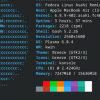The Difference Between GNU/Linux Distributions
A lot of people have heard of GNU/Linux (more commonly referred to as just "Linux") and are having trouble finding out what the differences are between different versions -- or distributions -- that are available. This article will outline the differences between several popular GNU/Linux distributions and similar operating systems. In the tradition of Rabbi Hillel: standing on one foot, GNU/Linux is an operating system consisting of several different pieces designed and maintained by the world's largest community of software developers. The rest is commentary.
But it's the commentary that you're here for, so this is where the heart of this article will be. Linux is a kernel (the kernel is the heart of the operating system, and it allows the software to interact with the hardware) and it is complemented by the GNU utilities that complete the operating system by allowing the user to interface with it. Different companies or organizations will take those various pieces and make little changes to them and bundle other software with them, thus creating a distribution of GNU/Linux.









































































